Electric Vehicles (EVs), also referred to as battery electric vehicles are undoubtedly becoming the future of automobile ingenuity. Each year, car manufacturers increasingly add EVs to their lineup to ensure phasing out of petrol and diesel-powered vehicles by 2030.
Electric Vehicles in Ghana
In Ghana, a few companies such as SolarTaxi and Accraine Ghana have risen to the challenge of ensuring Ghana does not miss out on the move to roll out Electric Vehicles. In 2019, the Ghana Energy Commission launched the Drive Electric Initiative to promote the adoption of electric vehicles in the country. Despite this positive drive, is Ghana ready for electric vehicles given the country’s erratic power supply?
While some may say ‘no’ others might argue, it isn’t a matter of whether the country is ready or not, we simply have to make ourselves ready.
The world plans to phase out petrol and diesel-powered vehicles by 2030. If Ghana does not push in its efforts to join the rest of the world, the country will face numerous challenges in that regard.
Electric Vehicles in Ghana – Soon to be necessity
For one, there will be no more spare parts for fossil-fueled vehicles. Most of the manufacturing plants will shut down to pave way for the development of electric vehicle accessories. This will not only cut short the supply of fossil-fueled vehicle spare parts but disrupt the livelihoods of the many spare parts dealers in the country.
Mr. Boakye, an engineer who spoke to the Ghana News Agency in Accra, noted that Ghana wasn’t in a position to make an entire shift to the use of electric vehicles granted that “there is not enough power.” He, however, indicated that Ghana must make itself ready to make the switch.
“As it stands, we cannot roll out electric vehicles entirely because there is not enough power. Electricity in Ghana is said to be the most expensive in the sub-region to the extent that some countries are not inclined to buy our power,” Mr. Boakye said.
“…The issue is not whether we are ready or not. We have to start and work our way towards switching, because vehicle manufactures are gradually shifting from internal combustion engine vehicles to electric vehicles. Most plants will be shutting down in the next 10 years.
The worse is that if we do not plan and work towards such a transformation, we may not get spare parts for fossil-fueled vehicles. This is because the manufacturing plants in the west where we source these vehicles would have been shut down and it will be a challenge for us,” he further added.
According to Mr Boakye, Ghana’s Nuclear Power Programme which is expected to be completed in 2030 could be the game-changer to support electric vehicle drive.
“Nuclear power has a big role to play in helping the country to achieve its goal of joining the world in the fossil to electric switch. Other sources of energy are either being exhausted or adversely impacted by climate change effects,’ he said.
Electric Cars in Ghana – How electric car works
According to the U.S Department of Energy, electric vehicles use a large traction battery pack to power an electric motor which must be plugged into a wall outlet or charging equipment known as the Electric Vehicle Supply Equipment (EVSE).

Why the push for electric vehicles
The push for the use of electric vehicles is based on one major factor, climate change. Internal combustion engines run on petrol and diesel that release harmful gases such as carbon monoxide into the earth’s atmosphere which has led to the heating of the earth’s surface, oceans, atmosphere, and natural habitats. This has further led to erratic climatic conditions and unmitigated disasters.
“The number of weather, climate, and water extremes are increasing and will become more frequent and severe in many parts of the world as a result of climate change,” said WMO Secretary-General Prof Petteri Taalas.
“That means more heatwaves, drought, and forest fires such as those we have observed recently in Europe and North America. We have more water vapour in the atmosphere, which is exacerbating extreme rainfall and deadly flooding. The warming of the oceans has affected the frequency and area of existence of the most intense tropical storms,” he added.
In the 50 years (1970-2019), over two (2) million people died as a result of the weather-related disaster, with economic losses amounting to $3.64 trillion, that is according to the BBC.
To limit the harmful effect of greenhouse gases on the planet, an agreement known as the Paris Agreement was adopted in 2015 by 196 parties at the United Nations Climate Change Conference (COP21) in Paris. It came into force on November 4, 2016.
The goal is to limit the global temperature increase in this century (21st century) to 2 degrees Celsius above preindustrial levels.
One of the ways to help do that is through the introduction of electric vehicles which have no carbon emissions.





